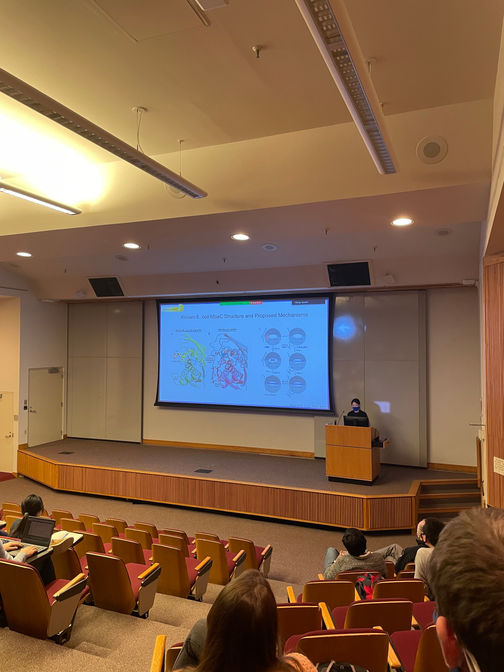
Teaching
Teaching Philosophy
The interdisciplinary field of "biochemistry" seamlessly bridges the realms of biological phenomenon and intricate chemical structures, interwoven with arrow-pushing mechanisms. As a biochemist, navigating the terrain between theoretical concepts and their real-world applications, as well as constantly acquiring new knowledge and making fresh discoveries, emerges as a recurring theme in this captivating domain. Here, bridging the gap in science communication by using non-scientific language becomes crucial for an instructor.
From a personal perspective, I've long believed that "teaching" and "learning" are symbiotic endeavors. Teaching empowers me to decipher complex concepts and convey them in simple language, often using real-life examples as illuminating guides. It deepens my understanding of a subject and allows me to impart knowledge to eager students. Attributed to Benjamin Franklin, the timeless adage, "Tell me and I forget, teach me and I may remember, involve me and I learn," has profoundly resonated with me. I am steadfast in my commitment to integrating this wisdom into my classroom.
To realize this objective, my approach as an instructor encompasses three key principles:
Accessibility &
Diversity
I encourage students to perform science communication using non-scientific language. While learning the biological concept, students are encouraged to connect theories to practical examples. I will ensure that slides and course materials are readily available to students, fostering a learning environment that supports easy access to resources. Students are welcome to use their dialogues to communicate.
Active engagement
I promote active learning through group activities in class, offer opportunities for extra credit through individual or group projects, and facilitate peer instruction and evaluation. These practices inspire students to become active participants in their own education.
Collaborative learning
I establish a Q&A forum where students can pose questions and engage in peer-to-peer communication, serving as an invaluable troubleshooting tool. This collaborative platform enriches the learning experience by fostering a sense of community among students.
By embracing these principles, I endeavor to create a classroom environment that not only imparts knowledge but also encourages students to immerse themselves in the subject matter, fostering a deeper and more lasting understanding of biochemistry.
Teaching Experience
During my undergraduate studies, I served as a teaching assistant (TA) and learning assistant (LA) in middle-level chemistry and biochemistry classes. Fortunately, I had the opportunity to engage with active learning classrooms, and these experiences evoked distinct yet ultimately convergent sentiments. As a LA in a middle-level organic chemistry class at Penn State, I assumed the crucial role of bridging the gap between the instructor and the students. In a lecture hall accommodating 200 individuals, the LA functioned as a readily accessible resource during class activities, fostering a more interactive learning environment where students felt less inhibited about asking questions. With a growing number of LAs dispersed throughout the classroom, instructors gained increased flexibility in monitoring the learning atmosphere and assessing student reactions to class activities. Although these activities occupied a significant portion of class time, students began to internalize concepts and employ these activities as valuable tools for self-guided or peer-assisted learning. My personal experience as a Learning Assistant, having initially taken the class and subsequently been selected as an LA for a new semester, proved to be both enlightening and rejuvenating. It allowed me to revisit familiar concepts and witness diverse interpretations among students from various academic backgrounds. During my own academic journey, my role as a Learning Assistant for a middle-level class has played a crucial role in solidifying my foundational knowledge and furthering my understanding of advanced courses. I take immense pride in being able to apply my own study techniques to assist fellow students, a sense of accomplishment that motivates me to delve even deeper into course materials, promoting active thinking and self-directed learning. These experiences have inspired me to provide similar opportunities to my own students, fostering learning through engaging class activities and peer instruction to strengthen their grasp of intricate concepts. Being a Learning Assistant not only revisits familiar subject matter but also encourages students to relate these concepts to their own experiences, thereby enhancing their overall comprehension. As a Teaching Assistant for Biochem 301 at Duke University, I had the privilege of leading multiple lecture sections dedicated to introducing special topics related to human health and their connection to our course material. During these sessions, I crafted open-ended questions that encouraged students to collaborate in groups and brainstorm solutions. The end-of-semester feedback I received from students was overwhelmingly positive, with many expressing how informative and engaging they found these special lecture sessions. In fact, some students expressed interest in pursuing these topics as the basis for their thesis projects. I firmly believe that class activities that stimulate critical thinking among students are essential for helping them gain a clearer understanding of their academic goals.
Qualified Classes
I am qualified to teach general biochemistry 1 and organic chemistry level 1 and 2, based on my previous experience. I can also give seminars about enzymology and mass spectrometry and structural biology.



